Lesson 13 How Is School Going
七下Lesson13

(4)Jenny has __s_o__c_ia_l__ studies, shop, math, French, English and art.
Read and finish Exercise 2 in Let’s Do It. (1)How is Jenny’s school life going?
=Danny _d_o_e_s_w_e_l_l_in__d_r_a_w_i_n_g_.
st week,I made a bird house all by myself. myself 我自己,yourself你自己,
himself他自己,herself她自己,
itself 它自己,ourselves我们自己,
yourselves你们自己,
themselves他/她/它们自己
by oneself “单独,独自” enjoy oneself 玩的开心 teach oneself 自学
7.I am a little busy this term. be busy doing sth 忙于做...
=be busy with sth Tom's mother is busy_c__o_o_k_i_ng(cook) breakfast for Tom.
__D__o_e_s__she have____a_n_y____good news? 19. I often join in the high jump.(改为同义句)
I often_t_a_k_e____ __p_a_r_t___ __i_n_____the high jump. 20. We had a sports meet last term. (对画线部分提问)
Lesson13_How__is__school__going
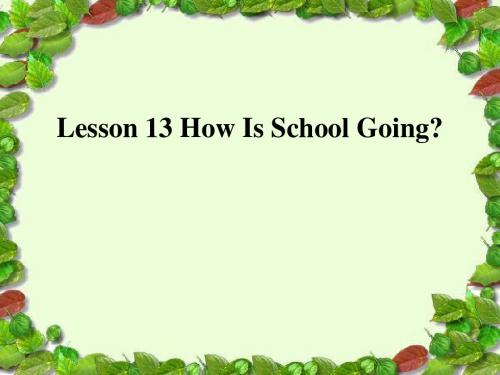
• ually为频度副词,意为通常,经常,常用how often提问 • He usually send e-mails to his friends.他经常给他的朋 友发电子邮件。 • 区分:always,usually,often,sometimes,never • Always:总是,一直 为频度较大的副词 • Usually:通常 指很少有例外,频度仅次于always • Often:经常,常常 表示不确定具体s:有时 指偶尔做某事,没有连续性,频 • 度比often小 • Never:从来没有 含义与always相反 • 频度强弱依次是:always>usually>often>sometimes >never
• 6.And与or的用法: • And 的基本意义为“和,又,而”连接并列 的单词、词组、短语或句子,起承上启下的 作用,他所连接的短语属于并列关系,前后 是没有矛盾的。 • Or表示“或者”,也用于连接并列的单词、 词组、短语或句子。
• 7.Interested与interesting: • Interesting含义是令人感兴趣的,有趣的。主 语是物 • Interested含义是感兴趣,对…..感兴趣。含有 被动的意味,主语通常是人,多用于 be/get/feel/become interested in sth 意为对…感 兴趣 • 它的名词形式是interest,意为“兴趣,趣味 ” • The girl shows interest in music. • 这个女孩对音乐感兴趣。 • Interest还可以做动词意为使感兴趣,主语多 为物 • The novel may interest you.那本小说会让你感 兴趣的。
• 4.I start school at 8:00a.m.I usually finish at 5:00p.m.我早晨八点上课下午五点放学。 • Start作动词意为着手,开始,相当于begin,其 后跟to do或doing,意为“开始做。。。。” • How were you when you first started to play/playing the piano?你几岁开始弹琴? • I started learning English when I was 5 years old. 当我5岁时我开始学习英语。
冀教版七年级下册英语unit3 Lesson 13

10.—Hi, Mike! How’sitgoing?
—________ C
A. Goodidea. B. Ithinkso.
C. Notbad. D. Ofcourse.
二、用所给单词的适当形式完成句子
11. Howmany________ (class) classes
doyouhaveinthemorning?
4. Mikeiscrazyaboutstamps.
D
He________collectsstampsfirstwhereverhetravels.
A. neverB. seldomC. sometimesD. always
【点拨】考查频度副词辨析。句意为“迈克着迷于邮票。 无论在什么地方旅行,他总是首先集邮”。never从不; seldom不常; sometimes有时; always总是。故选D。
hday.
A. toB. forC. ofD. at
2.—Jack, youswamverywell. Whotaughtyou?
—Nobody. Itaught_______C_. A. IB. meC. myselfD. mine
3. Shesaysherfavourite______C__isEnglish. A. colourB. sportC. subjectD. project
start
4. Everyonelikesto____w__in__ (赢).
Noonewantstobealoser. 5. Ilearnhowtocookby________ (我自己).
myself
二、根据汉语提示完成句子, 并背记英语句子 6. 你的学校生活怎么样?
lesson13howisyourschoollifegoing
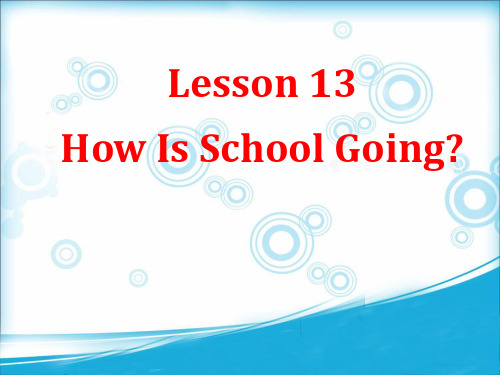
【探究总结】win, beat的用法
• 【学以致用】 • ①她在跳高比赛中获奖了。
• She __w_o_n__ __th_e___ m__a_tc_h__ in the high jump.
• ②I __b_e_a_t _ (win/beat) John at chess yesterday.
•Answer: Great! Pretty good! Everything goes well!
Not bad. Just so so! Everything is OK! Terrible!
合作探究
I start school at 8: 00 a. m. I usually finish at 5: 00 p. m.
in March. 5. We decided to __ta_k_e__p_a_r_t_i_n_ (参加) an
Lesson 13 How Is School Going?
自主学习1:Words
life /laif/ term /tə:m/ shop /∫כp/ start /stɑ:t/
n. 生活 n. 学期 n. 手工艺课 v. 开始;出发
finish /'fini∫/ win /win/ social /'səu∫əl/ twice /twais/ myself /mai'self/ yeah /jeə/
3. What is Wang Mei’s favourite subject? P.E. is her favourite.
4. What is Jenny’s favourite subject? Her favourite subject is shop.
5. What did Jenny make in shop class last week? Last week, she made a bird house all by herself.
冀教版七年级英语下册教学课件:Lesson 13(共25张PPT)
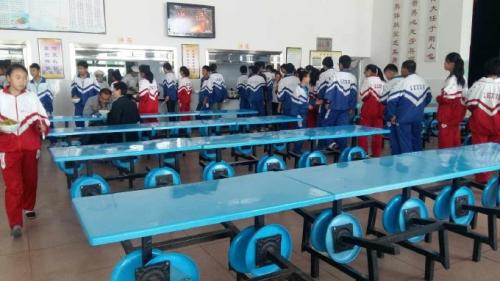
点拨2 对频率副词提问用how often.
Quiz.
1. Yao Ming is good at ________(play) basketball. 2. I start school at 8:00 a.m. ____ ____ ____ you start school? 3. We have a big sports meet twice a week. _____ ____ we have a big sports meet? 4. I ____ have six classes every day. A. too B. alao C. either. 5. My school subjects are so _________(interest). 6. Last term I______ (win) first place. 7. Last week, I made a bird house all by ____(I).
Yao Ming is good at _______(play) basketball.
Zhang Jie is good at ________(sing)
Liu Xiang is good at ________(run)
点拨1 be good at sth.善长于某事 be good at doing sth.善长于做某事
By learning this lesson, I can: 1. read and write the new words. 2. use the new phrases 3. write about my school life.
New words
term /tɜ:m/
start /sta:t/
初中英语七年级下册《Lesson 13 How Is School Going》
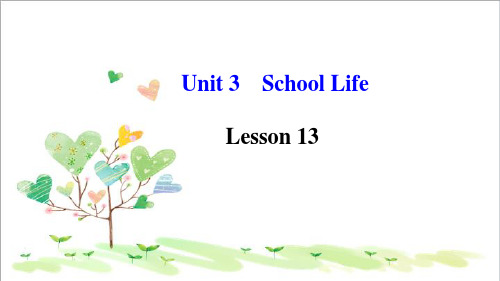
【活学活用】 ①第一节课8:45结束。 The first class ________ at 8: 45. ②一小时后,我们将做完作业。 We will ________ ________ our homework in an hour. 答案:①finishes ②finish doing
2. We always have a big sports meet twice a year. 我们总是每年举行两次大的运动会。 【自主领悟】twice作副词,表示次数,意为“两次”。twice a year每年两次。例如:I go to borrow books from the library twice a month. 我一个月去图书馆借两次书。
【归纳拓展】twice的用法
次数
twice在英语中表示次数时,习惯用once表示“一次”,twice表示“两 次”,三次以上用“...times”表示
倍数
twice也可以表示倍数,意为“两倍”,相当于two times。例如:He is twice as tall as the kid.他的身高是那个孩子的两倍。
be gooiendly/kind to。例如:My mom is always good to me.妈妈一直对我很好。
be good for
“对……有好处”,反义短语为be bad for。例如:Running is good for our health.跑步对我们的健康有好处。
【活学活用】
①The boy goes shopping with his mother ________ a month.
A. two
B. twice
C. two times D. second
七年级下册lesson13how-is-school-going?
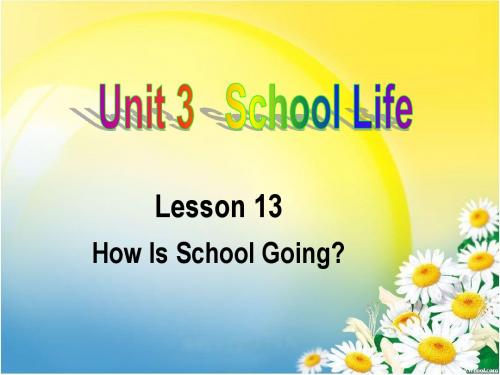
4.You’re good at the long jump. be good at 擅长,后跟n,v-ing,同义短 语为do well in ,比较级形式be better at e.g. Are you good at drawing? 你擅长画画吗?
st week, I made a bird house all by myself. by oneself 独立地;单独
3.I usually finish at 5 p.m. We always have a big sports meet twice a year. I often take part in the long jump.
句中的usually, always和often叫做频度 副词。是用来表示动作频率的,但程 度上有区别。 以上三个频度副词按频率大小排列如 下:always > usually > often
3. — Who taught you Japanese? — Nobody. I learned it by ______. (2012四川广安) A. myself B. my C. me 4. Welcome to our school, ladies and gentlemen. ______, I’d like to introduce myself. (2012山东菏泽) A. To be honest B. To my surprise C. To start with D. To tell you the truth
II. 单项选择。 1. — How often do the students play sports? — ______. (2012山东济南) A. Twice a day B. Since last night C. For two hours D. A month ago 2. Don’t worry about me. I’m old enough to think for ______. (2012河北) A. himself B. herself C. yourself D. myself
刘东明 在英语阅读教学中落实英语学习活动观

英语考试方向
•中国英语能力等级量表(2018年6月1日起实施)
每个等级在听说读写、口头和笔头翻译、知识 策略等八方面都有不同分技能的要求。
英语能力等级考试
• 英语能力等级考试(简称NETS)是在中国 英语能力等级量表的基础上研发的、包含 多个等级的英语水平考试体系,是实施测 评体系建设的另一项重要抓手。
题型:话题简述 知识点:考察能力:难易度:3 star 要点: 1.科技在快速地发展,我们未来的生活也会有很大的 改变;
2.将来人们不需要做家务,将会有机器人帮我们来做 ;大多数的艰苦工作也会由机器人来做,人们会有更 多的时间做他们喜欢的事; 我们在家里通过电脑在 网上可以学到想学的知识。
3. 未来的生活会越来越好。
解析2 With the development of science and technology, and our life will change a lot in the future. In the future people don't need to do chores. Robots will help us do housework. Most of hard work will also be done by robots. People will have more time to enjoy life. If we want to learn something, we can surf on the Internet with computers. So our future life will be become better and better.
请大家思考:
1.英语课程内容是发展学生英语学科核心素养 的基础,包括哪六个要素?
第三单元第一课课文
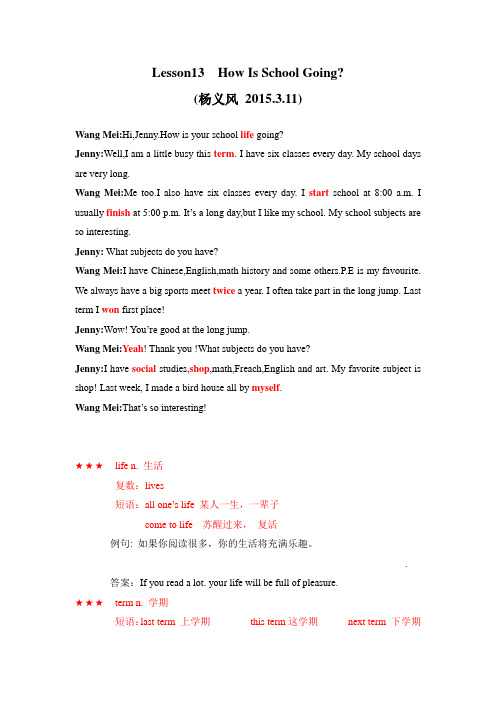
Lesson13 How Is School Going?(杨义风2015.3.11)Wang Mei:Hi,Jenny.How is your school life going?Jenny:Well,I am a little busy this term. I have six classes every day. My school days are very long.Wang Mei:Me too.I also have six classes every day. I start school at 8:00 a.m. I usually finish at 5:00 p.m. It’s a long day,but I like my school. My school subjects are so interesting.Jenny: What subjects do you have?Wang Mei:I have Chinese,English,math history and some others.P.E is my favourite. We always have a big sports meet twice a year. I often take part in the long jump. Last term I won first place!Jenny:Wow! You’re good at the long jump.Wang Mei:Yeah! Thank you !What subjects do you have?Jenny:I have social studies,shop,math,Freach,English and art. My favorite subject is shop! Last week, I made a bird house all by myself.Wang Mei:That’s so interesting!★★★life n. 生活复数:lives短语:all one’s life 某人一生,一辈子come to life 苏醒过来,复活例句: 如果你阅读很多,你的生活将充满乐趣。
《How-Is-School-Going》School-Life-PPT教学课件

4. A:What s_u_b_j_e_c_ts do you have? B: I have Chinese,English,math and some others.
5. A:How is your school __li_f_e__ going? B:Well,it's a little busy.
beat宾语是比赛或竞争的对手,即指人或团队的名 词或代词。其过去式为beat,过去分词为beat/beaten 。如:We beat the strongest team in the football match this time.在这次足球赛中我们战胜了最强的那 个队。
6.You're good at the long jump.
2 Read the the lesson and answer the questions.
1. How is Jenny's school life going?
A little busy. 2. How many classes does Wang Mei have every day?
Six classes.
3. I usually finish at 5:00 p.m. (1)usually是频度副词,意为“通常”,用来表示动作 发生的频率。常用在一般现在时的句子中,位于实 义动词之前,系动词、助动词、情态动词之后。常 用来回答由how often提出的问题。 (2)finish在此句中作不及物动词,意为“结束,完成” ;它也可作及物动词,后接动词时,需接动名词形 式。如:The task will be finished this week.任务这 周将会完成。
5.Last term I won first place! (1)【辨析】win与beat 二者都可用作及物动词,作“赢;战胜”讲,但用法 有区别。
how_is_cchool_going

• 翻译 • 1.一切都还好吧?
• 莉莉三周看望奶奶两次。
• 小明擅长唱歌。 • 吸烟有害健康
总结
1.新单词 2.新短语 3.新句子结构 4.你收获到了什么
作业
• 1.read lesson13 • 2.recite the new words and phreses • 3.finish the exercise of p34 in book
Think about:
1.How is your school life? 2.How many lessones do you have ?What are they?and when?
3what are you good at?
重点内容
1,How is your school life going你的 学校生活怎么样? How is……going?意为“……怎么样?” 这一句型是表达对朋友、家人关怀或问 候的常用语。其常见答语是:Great! Not bad。Terrible!Just so so。 Everying is ok!Everying goes well。
温故而知新 经历 建议 大开眼界 自己的 用一种新的方式
lesson 13
How is School going?
word in lesson 13
• life 生活 • term 学 期 • start开始 • finish完 成结束 • twice两 次两倍 • win获胜 (won/won) yeah是.对 social社会的 shop 手工艺课 myself我自己
例如,How is your work going?
Terrible!
重点内容
• • • • • • • • 1.how+be...going表示......怎么样了......还好吗 2.have/ has与there be的区别 have/has表示拥有 there be表示存在 3.finish用法finish to do sth与finish doing sth 前者表示完成去做, 后者表示完成正在做的事 4.twice a week/month/year一周/月/年两次 一次once 次数大于等于3, 数字+times 5.be busy to do/in doing sth忙于做某事
冀教版七年级英语下册Unit3 lesson13:How_Is_School_Going?教案

Lesson 13: How Is School Going?教案Teaching Analysis1. Teaching Aims●Knowledge Section:(1)Master the following words:life, term, start, finish, twice, win, social, myself(2)Common phrases:sport meet, twice a week \ year, long \ high jump, be good at, social studies, by oneself●Skill SectionContinue to build up the ability in listening, speaking, reading, writing and translating, especially enable the students to make sentences in English about their school life.●Affect SectionGet students to know how to describe their school life correctly.2.Teaching FocusV ocabulary and patterns in this lesson3. Difficult pointsHow is … going?Teaching AidsMultimedia, radio-tapeTeaching ProceduresStep I Class Opening (1 minutes)1.GreetingT: Good morning, class! How are you today?Ss: Good morning, Miss Dai ! Fine, thank you. And you?T: I’m fine, too.2.Free TalkT: What’s the date today?S1:It’s April 7th.T: What day is it today?S2: It’s Monday.T: Look out of the window. What’s the weather like today?S3: It’s sunny.[设计思路:使用亲切、贴近生活的问候语言拉近师生关系,带学生自然进入英语氛围。
七年级下册英语教案-Unit3-Lesson13HowIsSchoolGoing(冀教版)

七年级下册英语教案-Unit3-Lesson13HowIsSchoolGoing(冀教版)(冀教版英语七年级下册) Lesson 13 How Is School Going? 课题How Is School Going? 课时 1 课型new 教学内容分析本教学设计选自英语冀教版七年级下册第三单元第十三课。
本课的教学重难点是词组How is ......going? be good at、take part in、by oneself,频度副词及其用法。
所以本课的授课将采取讲练结合的方式帮助学生攻破难点。
教学目标设计本课教学中渗透了“知识与技能,过程与方法,情感与态度”三种目标。
首先,教给学生基本的知识内容,如什么频度副词。
然后通过对比和相关习题帮助学生掌握对这一知识点的运用。
学生情况分析七年级学生好动、好奇、好表现,应采用形象生动、形式多样的教学方法和学生广泛、积极主动参与的学习方式去激发学生学习的兴趣。
生理上,学生好动,注意力易分散,爱发表见解,希望得到老师的表扬,所以在教学中应抓住学生这一特点,发挥学生的积极性。
设计教学活动时关注整体,层次分明。
教1.Knowledge Goal:① Grasp the new words: life, term, start, finish,twice, win,social, myself②Master the usage of phrases:学目标How is ......going? be good at、take part in、by oneselfMake students be able to distinguish andmake use of the frequency adverbs.2.Ability Goal: By the method of Task-based Language Teachingand pair-work, students get to know the main ideaof the text and use the frequency adverbs fluently.3.Moral Goal: Make students be interested in studying and learnto cooperate with others.重点the new phrases and the frequency adverbs难点Distinguish the five adverbs: always, often, usually, sometimes,never教法Task- based Language Teaching, pair-work教具audiotape, PPT, some pictures for competition教学过程教学步骤教师活动学生活动设计意图新课导入Step I Warming up:(1 minute)Teacher plays the happy songand sing it with students.Step II Leading in: (1 minute)Teacher says: I feel happy. Howdo you feel today?Students sing thehappy song and dothe actions with theteacher.Students answer thequestion voluntarily.It aims tomake theclass activeand lead inthe newlesson.新课教学Step III New words:(5 minutes) life, term, start,finish,twice, win,social, myself Teacher says: Most of us arehappy at school, because there are many subjects we like. Nowplease look at the board and seewhat subjects we have. Teacherplays the PPT.Then teacher shows the newword “shop”Next T shows each new word withthe help of the phonetics. Then teacher check students pronunciation and lead them toread the new words.Game: Teacher shows the newwords on the PPT and asksstudents to have a competition toread the words and get scores fortheir groups.Exercises:(1)We ____ our class at 8 a.m.and _______it at 5 p.m. Today.(2)This year, we ____ thebasketball game and we were Students competeto read the words.Students are notsure if it’s a subject and ask some questions about it. Students read the words by themselves according to the phonetics. Students read the words as soon as possible. And the better group get scores.Students do the exercises according to what they have learnt. Motivatestudents totake part inthe activityand developtheir senseofcooperation. Students findthe questionand ask.Checkstudents’pronunciationand learn thenew words.Help studentsremember thewords.Consolidation新课教学proud of it.(3)______ do _____ homeworkby _______ every day. (I)Step IV Listening (2 minutes) Practice students’listening ability.T shows a picture by PPT to the students and play the audio tape. Step V Reading (5 minutes) Teacher asks the students to read the lesson and answer the questions. Teacher shows the questions by PPT.(1)How is Jenny’s school life going?(2)How many classes does Wang Mei have every day?(3)What is Wang Mei’s favourite subject?(4)What is Jenny’s favourite subject?(5)What did Jenny make in shop class last week?Then teacher checks their answers. (3 minutes)Step VI Text (20 minutes) Explain the whole text, especially the new phrases and the frequency adverbs.(1)New phrases:① How is ___ going?(......怎么样?)Teacher makes use of the sentence in the text to explain the Students listen to itquietly and writedown what subjectsthey have.Students read thetext and answer thequestions on theirown. They can have abrief understanding ofthe text at the sametime.Students listen tothe teacher carefully.Students answer thequestion andunderstand themeaning of thePracticestudents’listeningability andfinish the task.Practicestudents’readingability.Teach thecontentdirectly andmakestudents paymoreattention toit.新课教学phrase.“How is your school life going?”② be good at ......Teacher explains the phrase directly and show the phrase “do well in”for students. And the teacher shows some pictures for students to make sentences on their own.③ take part in④ by oneself(Teach the phrases in the same way.)(2)Frequency adverbs: always, often, usually, sometimes, neverTeacher explains the wordsdirectly with the help of some examples.(Skill: 位置记忆口诀-主谓之间,系表之间,sometimes要除外)①You’re late again. You are always late for school.(埋怨)② They often\ usually go on a trip on holidays.③On weekends, I visit my grandparents sometimes.④ Jenny tries her best to study, so she never fails in her exam.Step VII Consolidation(2 minutes)Fill in the blanks with the correct forms of the words or phrases in the box.life finish subject take part inbe good at(1)I ___ singing. I want to be a singer in the future.(2)I start school at 8 a.m. and phrase.Students listencarefully and makesentences with thenew phrase.Students distinguishthe usage of thefrequency adverbsaccording to teacher’sexplanation.Students do theexercises according tothe knowledge they’velearned on their own.Then, they compete toanswer the question andget scores for theirgroups.To improvestudents’ability ofmaking useof thephrases.Helpstudentsunderstandthedifferencesamong thefrequencyadverbs.Consolidatewhat wehavelearned.___ at 5 p.m.(3)I often ___ the long jump at the sports meet.(4)A: What ___ do you have?B: I have Chinese, English, math and some others.(5)A: How is your school ___ going?B: Well, it’s a little busy.Step VIII Activity (7 minutes)Teacher asks students to have a pair work and have a dialogue practice.A: What subjects do you have? B: ......A: How many classes do you have?B: ......A: When does the first\second... class start?B: ......Step IX Conclusion(1 minute) Teacher leads students to review the knowledge.Step X. Homework(1 minute)①. Recite the new words,phrases and frequency adverbs in Lesson13. (all the students)②. Recite Paragraph 5 .(students after No. 30)③. Retell the content of the text.(Students before No. 30 including No. 30)Students work in pairsand write down theirclass timetable. Then useit to make up a dialogue.Time SubjectStudents say what theyhave learned.Make theatmosphereactive andpracticestudentsspokenEnglish.It’s time forstudents toretell whatthey havelearned.板书设计Lesson 13 How Is School Going?New words: Phrases: Frequency adverbs: life /la?f/ How is ... Going? alwaysterm /t?:m/ be good at oftenstart /stɑ:t/ take part in usuallyfinish /fInI?/ by oneself sometimesnever课堂小结1.回忆本课的主要内容。
七年级英语下册Lesson13HowIsSchoolGoing教学设计(冀教版)

4.针对学生的疑问,教师进行个别指导,帮助他们理解和掌握所学知识。
(三)学生小组讨论(500字)
1.教师将学生分成小组,让他们用英语讨论以下问题:“What subjects do you like and why?”、“How is your school going?”等。
1.请学生用英语写一篇短文,介绍自己的学校生活,包括最喜欢的学科、课堂活动、课外活动等,要求运用一般现在时态和一般过去时态。
2.学生以小组为单位,制作一份关于学科喜好调查的报告。报告中需包括采访对象、采访问题、调查结果等内容,要求图文并茂,用英语展示。
3.家长参与作业:请家长协助学生用英语进行一次家庭访谈,了解家庭成员的学科喜好,并整理成访谈记录。
二、学情分析
七年级下册的学生已经具备了一定的英语基础,他们对英语学习有了一定的了解,同时也积累了一定的词汇量和语法知识。在此基础上,学生对本课的话题“学校生活”较为熟悉,能够结合自身实际进行讨论和交流。然而,学生在实际运用中仍存在一些问题,如词汇、句型的运用不够熟练,语法时态混淆等。
针对这些问题,教师在教学过程中应注重以下几点:
3.教师选取部分学生的作业进行展示和点评,指出他们的优点和不足,并进行针对性指导。
4.针对学生在练习中遇到的问题,教师组织小组讨论,共同解决问题。
(五)总结归纳(500字)
1.教师邀请学生分享本节课的收获,包括词汇、句型、语法等方面的知识。
2.教师对本节课的学习内容进行总结,强调重点和难点。
3.学生进行自我反思,评价自己在课堂上的表现,找出自己的不足之处,并制定改进措施。
3.培养学生学会关心他人,尊重他人的观点和喜好,增强同学之间的友谊。
冀教版英语七年级下册Lesson-13-How-Is-School-Going?说课稿英文版

冀教版英语七年级下册Unit 3 Lesson 13:How IsSchool Going?说课稿Hello, everyone,My topic today is taken from Lesson 13 of Unit 3 in Student Book 7 B. I decide to say this lesson from 6 parts.Part 1: Analysis of the Teaching MaterialPart 2: Analysis of the StudentsPart 3: Teaching methodsPart 4: Studying waysPart 5: Teaching stepsPart 6: Blackboard DesignPart 1: Analysis of the Teaching MaterialThere are three small parts in Part 1.1.Status & function:The topic of Unit 3 is about School life.By learning this unit, students are required to be able to master some expressions of school life. They can talk about their school life fluently in English. And cultivate students' good quality of caring for others. This lesson is the basis of learning this unit.2.Teaching Aims:1)Knowledge objects:To master the important words: life,term,start,finish...To express the sentences correctly: What subject do you have?What’s your favourite subject?...2)Ability objects:Let students understand how to simply describe school and study life,and introduce their school life to others.3)Moral objects:To stimulate the students' interest in learning English;To let the students learn to care about others;To make it clear about their learning direction, and to do their best to achieve their goals.3.Teaching important & difficult points:1)Teaching important points:Master the key words about school life: term,start,life....Stimulate students' interest and let them introduce their school life.Master the key sentences: How is your school life going?...2)Teaching difficult points:Introduce your school life with what you have learned.Use of reflexive pronounsPart 2.Analysis of the StudentsStudents of Grade 7 are active in thinking, hoping to be recognized by teachers and students, but the effective attention in class is relatively poor. And most students have poor vocabulary. The topic of this class is about students' daily life, so most students can participate in the discussion. They can use some simple expressions to express their daily activities. In this way, the classroom efficiency can be improved.Part 3.Teaching methodsTask-based teaching methodSituational teaching methodPart 4. Studying waysHelp the students to learn to study independently, learn to cooperate with others. In class, encourage the students to communicate with others and build up their confidence.Part 5.Teaching stepsStep 1: Lead inLead in by showing some pictures of our school and ask some questions.Do you like your school?What is your school life like?Purpose of my designing: Go straight to the theme, let students talk about their school life, in contrast to school life in Canada in this class.Step 2: The New Words1)Let the students read the words by themselves.2)Listen to the tape and follow to correct their mistakes.3)Check in groups.Purpose of my designing: Learning words is divided into three smalllinks. One is to use the way of migration to learn words. The second is to let the students listen to the tape and follow to correct their pronunciations. Third is to let the students check in groups. They can remember the words better and improve their cooperation.Step 3: Read aloudRead the text aloud and underline the words you don't know how to read.Purpose of my designing: 1)To practice the students' reading skills.2)To let the students understand the general content of the article, and underline the words they can not read, to prepare for the next listening.Step 4: Listen and followListen and follow silently. Pay attention to the words you underlined.Purpose of my designing: To correct their pronunciations.Step 5: Listen and imitateListen again and follow it. Try to imitate.Purpose of my designing: 1)To practice their listening skills.2)To let the students imitate the correct pronunciation and intonation.Step 6: Read and retellRead the text again and then try to retell it.Purpose of my designing: 1)To practice the students' reading skills.2)To let the students be familiar with the text and try to retell it in their own words.Step 7: Group workDiscuss in groups. Talk about your school life.Purpose of my designing: 1)To practice the students' speaking skills.2)To let the students talk about their school life in groups and share with others.Step 8: Watch a videoLet the students watch a video about the school life of Tsinghua University.Purpose of my designing: 1)To let the students know“The mostscary thing is that the people who are more excellent than you still work harder than you ”.2)To encourage the students to work harder and try their best to achieve their goals.Step 9: HomeworkWrite a short note about your school life and make a plan to improve yourself. Purpose of my designing: To practice their writing skills. Part 6.Blackboard DesignPurpose of my designing: Present the main parts about school life to let the students understand better.That’s all. Thanks for your listening.classes feeling school buildings subjects school lifescheduleactivitiesLesson 13: How Is School Going?。
Lesson

B:Well, it's a little busy.
Let's Do It !
4)Work in pairs. Write down your class timetable. Then use it to make up a dialogue.
开始下雨了。
考点4 finish / fɪnɪʃ/ v. 完成;结束
考向
finish+名词/代词意为“完成……”;finish doing sth.“做完某事”。finish 的反义词为: begin 或 start。
eg:Have you finished your homework? 你完成你的家庭作业了吗?
由于他的参与,我们赢得了比赛。
典例 —Great! Our women’s volleyball team ___A__ the gold
medal(金牌)in Rio Olympic Games on Saturday.
—Yes. We see the great spirit of Chinese women’s
Unit 3 School Life
Lesson 13 How Is School Going?
同学们,上一课学习的单词、短语和句型你们都掌 握了吗?现在大家来检验一下,点击下面的音频开始听 写吧!
Now you are all middle school students. How is your school life? What subjects do you have?
Howisschoolgoing

Lesson13 How is school going说课稿柴沟堡第二中学武慧文一、教材分析1、教材的地位和作用本单元的中心话题是学校生活。
通过学习本单元,要求学生能够牢靠掌握一些学校生活的表达形式,能用英语熟练表达并角色表演师生和生生的有关校内生活的对话。
培养学生健康意识和关爱他人的良好品质。
本课是学习是学习这一单元的基础。
2、教学目标依据初中英语新课标对对话课的要求,本课的教学内容特点以及所教班级学生的具体情况确定如下教学目标: 目标(1)通过听课文录音,学生们能正确形象地朗读本课对话。
目标(2)学习并巩固新单词掌握并运用四会;ter mstar tfini shtwi cewin 了解三会词:yeah shop。
目标(3)以观察,比较,分析,合作探究等多种方法,借助英语词典独立解决并掌握运用本课重点短语和句子:h ow is …goi ng spo rts m eet t wice a week /year lon g/high jump three times a d ay。
能正确表达校内生活的简单对话。
目标(4)本科通过Wang Mei 和Jenny 的对话,让学生了解中西方学校课程设置的不同。
3、教学重点和难点重点(1)掌握并运用四会词。
重点(2)独立解决并掌握运用本课重点短语和句子。
其中重点( 2 )也是本课的难点。
因为培养学生自学能力非一日之功;培养学生合作意识和习惯,也需要较长过程。
二、教学策略本课在教法上主要采用情景教学法设疑法,讨论法和角色表演。
充分发挥教师的主导作用和学生的主体地位,利用多媒体来优化教学过程,同时引导学生进行角色表演,创设真实场景,为学生学习提供生动活泼的语言学习环境,激发他们主动参与学习的渴望。
努力培养学生自学能力,把学习的钥匙交给学生,变“ 讲堂”为“ 学堂” ,变“ 要我学”为“ 我要学”;同时授以科学的思维方法,适当安排自学、讨论、角色表演等活动。
How Is School Going

How Is School Going?
本编为大家提供各种类型的PPT课件,如数学课件、语文课件、英语课件、地理课件、历史课件、政治课件、化学课件、物理课件等等,想了解不同课件格式和写法,敬请下载!
Moreover, our store provides various types of classic sample essays, such as contract agreements, documentary evidence, planning plans, summary reports, party and youth organization materials, reading notes, post reading reflections, essay encyclopedias, lesson plan materials, other sample essays, etc. If you want to learn about different formats and writing methods of sample essays, please stay tuned!
myself
sports
cleaning
classes
Ⅱ. 单项选择1. Do you want to _____ the school sports meet? A. take B. join C. take part in D. joined in2. My friend Mary is good _____ singing. A. at B. on C. in D. for
【探究总结】win, beat的用法
【图解助记】
beat sb. (in the match)(比赛中)赢了某人
- 1、下载文档前请自行甄别文档内容的完整性,平台不提供额外的编辑、内容补充、找答案等附加服务。
- 2、"仅部分预览"的文档,不可在线预览部分如存在完整性等问题,可反馈申请退款(可完整预览的文档不适用该条件!)。
- 3、如文档侵犯您的权益,请联系客服反馈,我们会尽快为您处理(人工客服工作时间:9:00-18:30)。
【探究总结】win, beat的用法
【图解助记】
beat sb. (in the match) (比赛中)赢了某人
win the match 赢了比赛
【学以致用】 ①她在跳高比赛中获奖了。 She ______ ______ ______ in the high jump. ②I ______ (win/beat) John at chess yesterday. 答案:①won the prize ②beat
2.English is my favorite subject, and I am good _____ at it. 3.She is good at cooking _______ (cook).
合作探究5
win v. 赢得;获得
◆Last term I won first place! 上学期我赢得了第一名! ◆We won the match yesterday. 昨天我们赢了比赛。 ◆Who won the race? 谁在赛跑中获胜了? ◆We beat their team by 10 points. 我们赢了他们队10分。
e.g. Are you good at drawing? 你擅长画画吗?
【学以致用】 1.Some people _______ swimming. Because they think swimming _______ their health. A. are good at; is good for B. are good for; is good with C. are good to; is good for
Wang Mei: Chinese, English, math, history, P.E. and some others.
Jenny: Social studies, shop, math, French, English and art.
合作探究1 How is your school life going?
合作探究2
I start school at 8: 00 a. m. I usually finish at 5: 00 p. m. 我通常早上8:00上课,下午5:00放学。 finish v. 完成;结束 I finished cleaning the room at 5: 00. 我五点钟打扫完房间。
• • • •
•
1. How is- --going? ---怎么样?/---都好吗? 2.a little = a bit 修饰 adj/ adv a little +un.= a bit of + un. 3.start = begin to do. 4.finish+ doing/ n/ 代 5.twice / once----- a day/ year/ weak/ month 6. win (won) +---match/ game/ prize beat (beat) + s.b. 7.be good at +doing/ n/ 代 8. shop (v. n.)
=It started/began raining.
合作探究4
You’ re good at the long jump. 你擅长跳远。 Lin Tao is good at running 林涛擅长跑步。
be good at sth./doing sth. be good at 擅长=do well in
Practice
1. — How often do the students play sports? — ______. (2012山东济南) A. Twice a day B. Since last night C. For two hours D. A month ago 2. Don’t worry about me. I’m old enough to think for ______. (2012河北) A. himself B. herself C. yourself D. myself
Let’s practice
A: What subjects do you have? B: We have… B: we have it once / twice / three times …
A: How many classes do you have every day?
• • • • • •
【探究总结】finish的用法 finish后跟名词、代词或动词-ing形式。
【学以致用】 writing (write) the Please finish _________ words this afternoon.
合作探究3 • • • • start to do sth./doing sth. =begin to do/doing sth. Translation: 开始下雨啦。 It started/began to rain.
合作探究6 I usually finish at 5 p.m. We always have a big sports meet twice a year. I often take part in the long jump. 句中的usually, always和often叫做频度 副词。是用来表示动作频率的,但程 度上有区别。 以上三个频度副词按频率大小排列如 下:always > usually > often
How is … going? 意思是“……怎么样?” 用来询问对方最近学习、工作、生活等 状况。答语一般为: pretty good. / Not bad./Terrible./ A little busy. 等等。 How is your job going? 你的工作怎么样? •最近在上海怎么样? How is it going in Shanghai?
5. I’ve already asked him _______ twice (two times). 6. Which year was it that Italy _____ won (win) the World Cup? 7. I had an active _______ social (社会的) life when I was at college. 8. I’ve bought _______ myself (I) a new coat.
频度副词在句中习惯上位于be动词、 助动词等之后,行为动词之前。
I usually help my mother. 我常常帮助我妈妈。 He is always ready to help others. 他总是乐意帮助别人。 It often rains here in April. 这儿四月份常下雨。
3. He jumped seven meters. He won first place in the _______. A. high jump B. jump high C. long jump D. jump long 4. My sister wants to be an actress _______ the future. A. at B. on C. in D. for 5. — _______ is your everyday life going? —Very well. A. What B. Why C. Which D. How
★ take part in 指参加会议或群众性活动 等,并在活动中发挥作用;
join 加入某个团体或组织等,并成为 其中一员; join in多指参加小规模的活动,如球 赛、游戏等,常用于日常口语中,有时可 与take part in互换。
1. Do you want to _______ the school sports meet? A. take B. join C. take part in D. joined in 2. My friend Mary is good _______ singing. A. at B. on C. in D. for
自主学习2:Phrases
1.学校生活
2.运动会 3.一年两次 4.第一名 5.擅长 6.跳远 7.社会科学
school life
sports meet twice a year first place be good at/do well in long jump social studies
8.独自\全靠我自己 all by oneself
Key points summary
Homework
n. 生活 n. 学期 v. 开始;出发 v. 完成;结束 adv. 两次;两倍 v. 赢得;获胜 int. (口语)是;对 adj. 社会的 n. 手工艺课 pron. 我自己
Practice
1. I’m not sure I want to spend the rest of my _____ life (生活) with him. term 学 2. We’re very busy during the ______( 期). 3. When do you s____ tart your new job? 4. The play finishes ______ (结束) with a song.
Translations
st term 2.this week 3.a.high jump 6.have a sports meet 上学期 这周 有一点忙 一年一次 跳高 举行一次运动会
Listen and list.
What subjects do they have?
Lesson 13
How Is School Going?
自主学习1:Words
life /laif/ term /tə:m/ start /stɑ:t/ finish /'fini∫/ twice /twais/ win /win/ yeah /jeə/ social /'səu∫əl/ shop /∫כp/ myself /mai'self/
